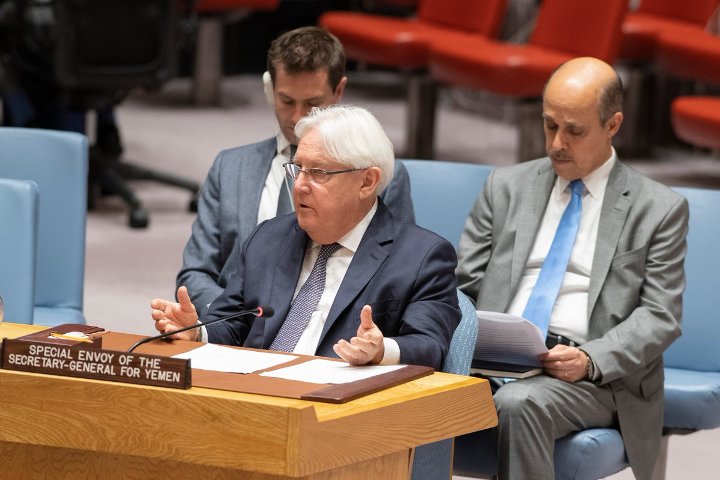EXPLAINER-UAE military drawdown raises stakes in south Yemen

- Country:
- United Arab Emirates
Attacks on Yemeni forces that form a core component of the Saudi-led military coalition in the south of the country risk further destabilizing Aden, the seat of the government, and complicating United Nations peace efforts.
The Iran-aligned Houthi movement, which the alliance has been battling for more than four years, launched a missile attack on United Arab Emirates-backed Security Belt forces in the southern port city, a coalition stronghold, that killed 36 soldiers on Thursday. The strike on a military parade was the worst violence to hit Aden since southern separatists forces, including Security Belt units, clashed with the Saudi-backed government of Abd-Rabbu Mansour Hadi in 2017 in a power struggle.
Analysts say the Houthis may be testing any weaknesses in the coalition following the UAE military drawdown in the south and western coast announced in June, which appears to have also emboldened Islamist militant groups in Yemen who carried out separate deadly attacks on southern forces last week.
WHY IS ADEN SIGNIFICANT?
The Houthis have stepped up missile and drone attacks on Saudi cities, but this is the first serious attack by the group on Aden since it was captured by the coalition in 2015. The Western-backed, Sunni Muslim alliance intervened in Yemen in 2015 against the Houthis after they ousted Hadi's government from power in the capital Sanaa in late 2014.
The Houthis, who hold most urban centers including Sanaa and the main port of Hodeidah, have no traction in the south, where the UAE has armed and trained some 90,000 Yemeni troops drawn from southern separatists and coastal plains fighters. The Houthis appear to be testing dynamics on the ground after the UAE withdrew some troops and hardware from the area, the only territory seized by the coalition in the war and where Saudi Arabia holds less sway.
"There seems to be an attempt to test where and how the balance of power can shift," said Elizabeth Dickinson of the International Crisis Group think tank. The attacks on southern security forces are also likely to heighten tensions between southern separatists and Hadi's government over who should control southern Yemen.
The war has revived old strains between north and south Yemen, formerly separate countries that united into a single state in 1990 under slain former President Ali Abdullah Saleh. The Southern Transitional Council blames Hadi's government for the area's security and economic woes and has instigated protests in the past. Adding to tensions, southern forces were hit in two attacks within two days claimed by Islamic State and al Qaeda, among Yemen's many destabilising forces.
The Council on Thursday called for restraint following the parade attack, which killed a Security Belt commander who was a leader among southern separatists, after many of its followers took to social media to threaten northerners in Aden.
WHY IS THE UAE SCALING DOWN ITS PRESENCE?
There are many reasons: war fatigue, Western criticism and rising Iran tensions that pose a risk closer to home. Abu Dhabi says its decision has been in the making for months and was a natural progression after a ceasefire went into effect last December in Hodeidah, which became the focus of the war last year when the coalition tried to seize it.
Diplomats say the UAE accepted there could be no military solution due to global criticism of coalition airstrikes that have killed thousands of civilians and a humanitarian crisis that has pushed Yemen to the brink of famine. Pressure by Western allies, including those that supply arms and intelligence to the coalition, to end the war that has killed tens of thousands, and heightened U.S.-Iran tensions, which risk triggering a direct confrontation in the Gulf, added impetus to the UAE decision.
A senior Emirati official said the UAE remained part of the coalition and would not leave a vacuum in Yemen as it continues to back the local forces it has built up to combat the Houthis and Islamist militant groups. Diplomats have said Abu Dhabi's move is building momentum for a U.N.-sponsored nationwide truce in the Arabian Peninsula nation this year, but that this would require a de-escalation of tensions between the Houthis and Saudi Arabia.
WHERE DO PEACE EFFORTS STAND?
Seven months on from the Stockholm pact, there has only been a unilateral Houthi withdrawal from Hodeidah ports. It has yet to be matched with a redeployment of coalition-backed forces that would pave the way for a full pullout by both sides.
U.N. envoy Martin Griffiths is shuttling between Yemen, Saudi Arabia, and the UAE to salvage the deal, the first major breakthrough in peace efforts in over four years and a gateway to launching talks on a political framework to end the war. A major sticking point in the Sweden pact remains to agree on who would ultimately control Hodeidah amid deep mistrust among all parties. The port handles the bulk of Yemen's commercial and aid supplies and is critical for feeding the long-impoverished country's 30 million population.
If broader political talks on a transitional ruling body materialize they would have to include Yemen's fractious parties, including southern separatists.
Also Read: CORRECTED-U.S. security adviser Bolton meets S.Korean officials to discuss N.Korea, alliance
(This story has not been edited by Devdiscourse staff and is auto-generated from a syndicated feed.)
ALSO READ
Tesla strike in Sweden continues, union says, contradicting Musk
Sweden will miss its climate goals without policy changes, environment agency says
Unified Investments LLC, led by Subodh Bajpai, introduces CATS CLUB AND BAR, revolutionizing Dubai's nightlife scene.
Soccer-Sweden's Olsson improving after suffering blood clots in brain
BRIEF-EgyptAir suspends flights between Cairo and Dubai until weather in UAE improves










